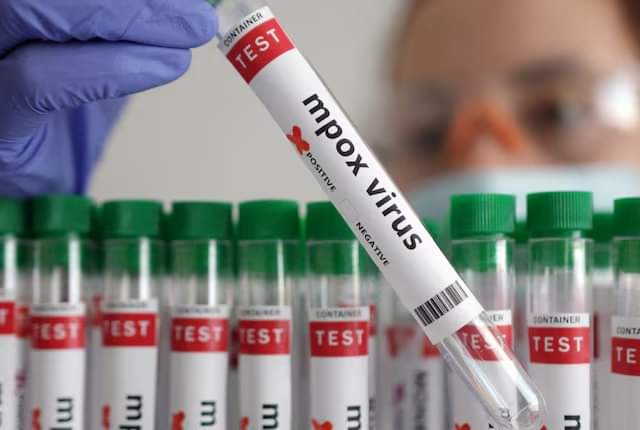By Adeyemi Adekunle
As Nigeria faces an alarming rise in Mpox cases, the virus has now spread to 30 local government areas across 19 states, including the Federal Capital Territory (FCT), with a total of 40 confirmed cases. This surge has been closely monitored by the Nigeria Centre for Disease Control and Prevention (NCDC), which has reported an additional 802 suspected cases in 33 states.
The outbreak has been linked to a new strain of the Mpox virus, further complicating the situation in a country still grappling with the aftermath of the COVID-19 pandemic.
This concerning development comes just days before the United States government delivered a much-needed donation of 10,000 doses of the Mpox vaccine to Nigeria.
The vaccine delivery is part of a broader international effort to curb the spread of Mpox, which the World Health Organization (WHO) and the Africa Centre for Disease Control and Prevention (ACDC) have declared a Public Health Emergency of International and Continental Concern (PHEIC/PHECC).
Mpox Outbreak: A Closer Look
Data from the NCDC’s latest Mpox situation report, released on August 19, 2024, reveals the breadth of the outbreak. Bayelsa, with five confirmed cases, has been the hardest-hit state, followed by Akwa Ibom, Enugu, and Cross River, each reporting four cases.
Benue has three confirmed cases, while states including the FCT, Delta, Anambra, Rivers, and Plateau each have two. Other affected states are Nasarawa, Lagos, Zamfara, Kebbi, Oyo, Abia, Imo, Ebonyi, and Osun, each reporting one or two cases.
Despite the significant spread of the virus, no deaths have been reported in Nigeria this year.
However, the situation is dire across the African continent, with 2,863 confirmed cases and 517 deaths recorded in 13 countries. The outbreak has been traced back to a new Mpox strain that emerged in Eastern Congo, which has since spread to Kenya, Rwanda, Uganda, and now threatens other regions.
Lagos on High Alert
The Lagos State Government has raised concerns over the potential risk of importing a new variant of Mpox, known as Clay 1, from neighboring African countries via airline and shipping routes.
During a recent media briefing, Lagos State Commissioner for Health, Akin Abayomi, highlighted the dangers posed by the spread of this new variant, which was first identified in the Democratic Republic of Congo (DRC).
“We are here today to discuss the risks associated with the new Mpox variant, Clay 1, which is currently circulating in the Democratic Republic of Congo and spreading to neighboring countries. Our concern is that this virus could be imported into Lagos through various airline and shipping routes, potentially bringing contaminated passengers, goods, or materials into our state,” Abayomi stated.
While Lagos has yet to report any active cases of the new variant, the state government has implemented preventive measures to mitigate the risk of an outbreak. These measures include the establishment of emergency operations centers specifically for Mpox and a statewide public health awareness campaign aimed at educating residents on how to avoid exposure to the virus.
U.S. Support and Nigeria’s Response
In a bid to bolster Nigeria’s efforts to contain the outbreak, the United States government has donated 10,000 doses of the JYNNEOS Mpox vaccine to the National Primary Health Care Development Agency (NPHCDA). U.S. Ambassador to Nigeria, Richard Mills, underscored the importance of this donation during a handover ceremony, emphasizing the need for global cooperation in addressing public health threats.
“The U.S. government recognizes that a public health threat in one place is a global health concern for all, and we have prioritized support for global health security, particularly in countries that are most vulnerable,” Mills said.
“I would like to commend the Government of Nigeria for being proactive in leveraging support and leading a coordinated effort to respond to the outbreak before it escalates.”
Dr. Muyi Aina, Executive Director of the NPHCDA, expressed the agency’s commitment to ensuring that the vaccines are distributed equitably and efficiently to those most at risk.
The vaccination strategy will prioritize frontline workers, individuals who have had close contact with confirmed Mpox cases, and vulnerable populations.
“Our strategy will prioritize frontline workers, individuals who have had close contact with confirmed Mpox cases, and vulnerable populations.
We will work closely with state and local health authorities to implement a targeted vaccination program that maximizes the impact of these limited but crucial resources,” Aina explained.
However, Aina cautioned that vaccination is just one aspect of the comprehensive approach needed to combat Mpox. The NPHCDA, in collaboration with the NCDC, will continue to strengthen surveillance systems to enhance Nigeria’s ability to detect and respond rapidly to new cases.
Understanding Mpox and Preventive Measures
Mpox is a rare viral zoonotic disease, meaning it is transmitted from animals to humans. The disease is endemic in several African countries, particularly in the tropical rainforests of Central and West Africa.
While the exact reservoir of the virus remains unknown, rodents, squirrels, and monkeys are suspected to play a role in its transmission.
The Mpox virus can spread from animals to humans through direct contact with infected animals’ blood, body fluids, skin, or mucosal lesions.
Human-to-human transmission occurs through contact with the virus from an infected person or contaminated materials, such as clothing and bedding. Symptoms of Mpox include fever, headache, body aches, weakness, swollen lymph nodes, and a rash that typically starts on the face before spreading to other parts of the body.
The NCDC has urged the public to adhere to proven infection prevention and control measures, including avoiding contact with animals that could harbor the virus, avoiding unnecessary physical contact with infected individuals, and practicing frequent handwashing.
The agency also advises ensuring that all animal food products are properly cooked before consumption and using protective clothing and gloves when handling sick animals or their infected tissues.
While Nigeria grapples with the spread of Mpox, the need for vigilant public health practices, timely vaccination, and international cooperation has never been more critical. The lessons learned from the COVID-19 pandemic serve as a stark reminder of the importance of swift, coordinated action in the face of emerging health threats.




